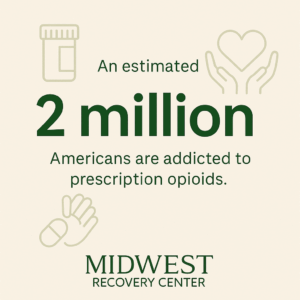Even when everything on the outside looks okay—work, family, routines—something underneath can still feel off. For many people, prescription painkillers started as a solution. A way to manage real pain, push through a tough recovery, or just make it through the day. But slowly, quietly, that line between “helpful” and “harmful” can blur.
At Midwest Recovery Center, we meet a lot of people who never thought they’d be the ones questioning their relationship with pain medication. There’s no chaos, no legal issues, no “rock bottom.” But there’s something else: a quiet fatigue, a fear of being found out, a voice whispering, “This isn’t working anymore.”
If that sounds familiar, here are seven painkiller addiction warning signs you should never ignore—especially when everything seems fine.
1. You’re Taking More Than Prescribed
It usually doesn’t start with a major leap. Maybe you took one extra pill to help you sleep after a stressful day. Maybe your prescribed dose just wasn’t cutting it anymore.
But taking more than prescribed—especially when done regularly—can be a sign that your body is building a tolerance. When you need more of the medication to feel the same effect, that’s your system adapting. And it’s one of the earliest indicators of physical dependence.
2. You Feel Sick, Anxious, or “Off” Without It
If you’ve ever delayed a dose and found yourself feeling jittery, sweaty, irritable, nauseated—or just generally “not right”—your body may be experiencing withdrawal. You might tell yourself it’s just stress or exhaustion, but these symptoms are often your body’s way of signaling it’s become dependent on the drug.
Painkillers are designed to interact with your brain’s reward and pain systems. When you take them regularly, your body starts relying on them. And when they’re suddenly absent, even for a few hours, it can create distress that’s hard to ignore.
3. You’re Getting Refills Early or From Multiple Sources
If you’ve ever stretched the truth with a doctor, filled a friend’s leftover script “just in case,” or visited multiple providers to ensure you have enough—this is a big red flag.
These behaviors don’t make you “bad.” They reflect how addiction changes our sense of urgency and survival. When your brain thinks you’re in danger without a substance, it will justify nearly anything to get more. But these patterns are unsustainable and potentially dangerous.
4. You’re Hiding or Downplaying Your Use
This might look like:
- Telling your partner you “ran out early” by mistake
- Moving pill bottles so no one notices
- Taking doses before events just to feel normal—but not mentioning it
Hiding is a defense mechanism. It doesn’t mean you’re lying maliciously. It means part of you already knows something’s wrong—and fears what might happen if someone else knew.

5. Daily Life Feels Heavier, Less Focused, or Foggy
Painkiller addiction doesn’t always show up as dramatic change. Sometimes, it’s just a steady erosion:
- You start missing small deadlines
- You forget conversations or appointments
- You feel less emotionally connected to people you care about
Over time, this fog becomes your new normal. You might blame it on stress or age. But often, it’s your body struggling to balance the chemical load.
6. You’ve Tried to Cut Back—But Couldn’t Stick With It
Many high-functioning individuals struggling with painkiller addiction program have attempted to taper their use. Maybe you even succeeded for a few days.
But stress kicks in. Pain flares up. Sleep gets harder. And suddenly, you’re back at the full dose—or more.
This cycle isn’t about weakness. It’s a sign that your system is in overdrive trying to recalibrate. You’re not broken. You’re chemically tangled—and that’s something that can be treated with professional support.
7. You Keep Telling Yourself: “It’s Not That Bad”
This is one of the clearest mental signs something might be off. If you find yourself constantly rationalizing your use with thoughts like:
- “I’m not like those people.”
- “It’s not affecting my job or family.”
- “I could stop if I really needed to.”
…that’s a signal worth listening to.
Painkiller addiction doesn’t always bring immediate consequences. But waiting for disaster isn’t necessary. You can get support before things spiral—and still protect everything you care about.
You Might Be High-Functioning—But That Doesn’t Mean You’re Okay
Painkiller addiction often hides in plain sight, especially for those balancing careers, caregiving, or public responsibilities. You might be holding it all together on paper. But inside, it feels like you’re crumbling.
If this resonates, you’re not alone. At Midwest Recovery Center, we see this every day. We offer confidential, customized treatment in Ohio designed to meet you where you are—without judgment, shame, or fear.
You don’t have to wait until you fall apart to get help.
Explore treatment options at Midwest Recovery Center.
Frequently Asked Questions About Painkiller Addiction
What counts as a painkiller?
Painkillers can include prescription opioids like oxycodone (OxyContin), hydrocodone (Vicodin), morphine, fentanyl, and codeine. While these drugs are effective for managing pain, they also carry a high risk of dependence—especially with long-term use.
How do I know if I’m addicted vs. just dependent?
Dependence means your body has adapted to the drug and may experience withdrawal without it. Addiction includes behavioral components—such as cravings, secrecy, or inability to stop using despite harm. A professional assessment can help you understand where you are on that spectrum.
Can I detox from painkillers at home?
It’s risky. Withdrawal from opioids can include nausea, vomiting, sweating, anxiety, and intense cravings. Professional detox ensures you’re monitored, supported, and protected from complications.
What does treatment at Midwest Recovery Center involve?
Our programs include individualized care plans, therapy, medical support, and group counseling. Whether you need outpatient support or a higher level of care, we help you create a plan that fits your life and your goals.
Will I have to stop working or taking care of my family?
Not necessarily. Many of our Ohio-based clients continue working or managing responsibilities while attending treatment. We offer flexible outpatient options to meet your schedule and support your recovery discreetly and respectfully.
Ready to Take the First Step?
If any of these warning signs feel familiar, don’t wait for things to get worse. Call Midwest Recovery Center at (833) 657-0858. We’re here to help you feel safe, supported, and clear about what comes next. This isn’t about labels. It’s about feeling like yourself again.







